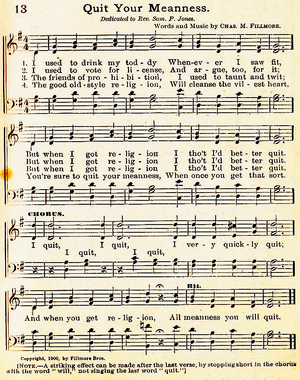
 ARDINAL RATZINGER famously called for a “new liturgical movement” (which Cardinal Burke has called a “Reform of the Reform”), but not all seem excited about such things. Rory Cooney is a “contemporary” liturgical composer famous for writing Bread of Life. Here are some lyrics * he wrote for that song:
ARDINAL RATZINGER famously called for a “new liturgical movement” (which Cardinal Burke has called a “Reform of the Reform”), but not all seem excited about such things. Rory Cooney is a “contemporary” liturgical composer famous for writing Bread of Life. Here are some lyrics * he wrote for that song:
I myself am the bread of life.
You and I are the bread of life,
taken and blessed, broken and shared by Christ
that the world may live. [ … ]This is our body, this is our blood:
a living sign of God in Christ. [etc.]
Rory Cooney recently had this to say about those who desire more reverent liturgies:
My inner optimist has started to heal over the last couple of years, surrendering to the harsh reality of recent successes in the reform-the-reform movement, but at the same time seeing that, well, it could have been a lot worse. I see that as an act of providence. The joy of writing has come back, even though things are far from ideal. It’s all right, I guess, to sing the Lord’s song in a foreign land after all. [source]

GHASTLY LYRICS APPEAR TO HAVE come into style following the Second Vatican Council. Open up the 1984 Glory & Praise (first published in the 1970s) and you’ll find “hymn texts” you won’t believe on every page. Here’s an example:
I am a man without envy | no roof and no walls to defend me, | in hope that someday you’ll befriend me, | and take all my troubles away. | Walk with me, talk with me, tell me about all the good things you’ve done; | stay with me, pray with me, | leave all your blues in your shoes at the door.
When it comes to “textual excellence,” Rory Cooney seems very much in the tradition of Glory & Praise. I often struggle to comprehend such songs. A case in point is Tom Conry’s Anthem:
We are called, we are chosen. We are Christ for one another. | We are promised to tomorrow, while we are for him today. | We are sign, we are wonder. We are sower, we are seed. | We are harvest, we are hungry. [sic] We are question, we are creed.
It’s probably fair to say that Cooney agrees with ideas put forth in the Glory & Praise Introduction, a must-read in spite of puzzling statements (“all of us are here by our presence”). Incidentally, some claim that texts in our Catholic songbooks have improved since the Council, but in my opinion the poetry remains horribly stilted, the melodies uninspired, and the theology superficial at best. Consider these lines from GIA’s newest hymnal (Worship IV):
Who is this who breaches borders | And subverts the social orders, | Crossing chasms that divide, | Casting race and class aside? | Who is this who eats with sinners, | Calling luckless losers “winners,” [etc.]
Turning to another random page, what do I find?
This is a day of new beginnings, | Time to remember, and move on, | Time to believe what love is bringing, | Laying to rest the pain that’s gone.
Yet another random page has these lyrics:
If life is like a wedding feast | and we are cast as guests, | then it is tragic not to know | the life God manifests. | Distracted by appearances, | seduced by praise or place, | if we remain outside ourselves | we miss this moment’s grace.
If life is like a wedding feast | and we are cast as hosts | then it is limiting to list | the ones we like the most | and leave apart, outside, unknown | uncounted other souls, | when love suggests there is no feast | till all the parts are whole.
I don’t like hearing Catholics denounce B16, and I’ve posted a song (upper right) called Quit Your Meanness. Hopefully Mr. Cooney, having sung that hymn, will delete what he wrote about B16’s beautiful liturgical example.
* You might ask, “As a musical composer, what are Rory’s theological and poetic qualifications for writing Catholic liturgical texts?” However, many “contemporary” composers (even the non-Catholic ones) routinely compose their own lyrics and translate Sacred Scripture, even though they’re unqualified for such tasks.

